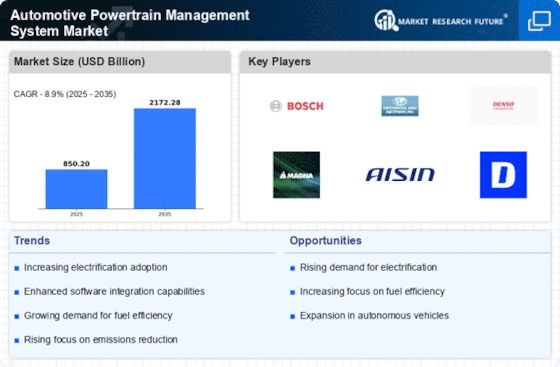Market Share
Automotive Powertrain Management System Market Share Analysis
Recently, significant developments have been witnessed in the Automotive Powertrain Management System market which reflect its dynamic character. When vehicles age they become emission complaint hence a power train is required to optimize engine performance and fuel efficiency accordingly.
The automotive powertrain management system industry has witnessed an upsurge in the integration of sophisticated electronic control units (ECUs) and sensors. A growing number of electronic components are being installed in modern cars, and power-train management systems are not an exception. Such high-tech ECUs allow for real-time monitoring and adjustment of engine timing, fuel injection, exhaust emissions among others. This trend highlights a larger shift within the sector as it moves towards smart cars and connected vehicles that increase efficiency overall.
The demand for electrified powertrains is another key factor shaping market trends. The transformation of powertrain management systems is occurring through the adoption of electric/hybrid powertrains by the automotive industry. Consequently, optimization efforts for internal combustion engines have expanded to include electric motor control and battery management. In addition, intelligent power-train management must integrate into this framework to enable seamless transitions between electrical and conventional propulsion systems hence fulfilling varying consumer needs while meeting strict environmental regulations.
Additionally, artificial intelligence (AI) as well as machine learning (ML) technologies have found market place within automotive powertrain management systems AI/ML applications allow predictive analysis & adaptive control so that system can learn from itself continuously optimizing its operational performance using parameters from driving conditions or even driver behavior itself; all this contributes towards increased fuel economies while at least making personal driving even more personalized.
Furthermore, sustainability concerns are influencing trends in the market for Powertrain Management Systems. Automakers increasingly intend to deliver solutions which curtail emissions thereby improving efficiency in energy outlays. These measures also include incorporation of start-stop systems along with regenerative braking and other energy recovery mechanisms in their PMS solutions aimed at reducing the carbon intensity attributable to their products internationally rather than just satisfying customer preferences who mostly look for environment friendly vehicles with low consumption levels.
Moreover, there is a transition toward modular scalable architectures happening in automotive powertrain management system market. The flexibility of these systems is being highlighted in order to cater to a wide spectrum of vehicles right from small city cars up to heavy trucks. This adaptiveness becomes crucial when there are multiple powertrains existing side by side such as internal combustion engines, hybrid systems, and all electric propulsion.


















Leave a Comment